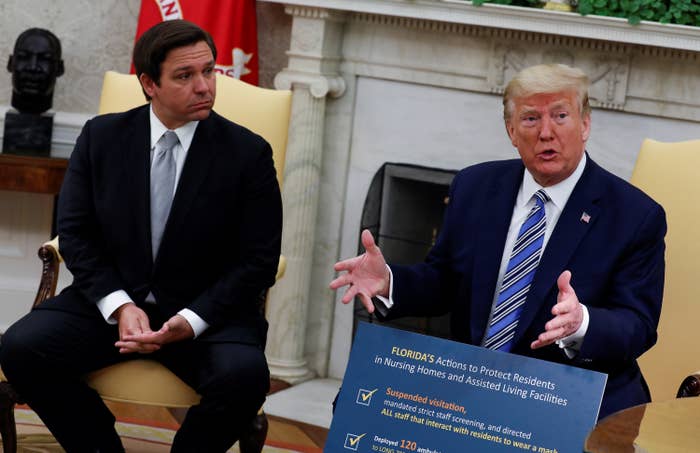
WASHINGTON — Two of President Donald Trump’s appointees to a federal appeals court have refused calls to recuse from a case that advocates say would affect the right of approximately 750,000 Florida residents with previous felony convictions to vote.
Voting rights advocates are challenging a Florida law that requires former felons to pay any outstanding legal financial obligations before they can vote, even if they can’t afford it. These obligations include the several hundred dollars in court fees and costs that are imposed in felony cases, as well as fines and restitution orders that can run in the thousands or even millions of dollars. Challengers argue a “pay-to-vote” policy is unconstitutional and the same as a prohibited poll tax.
The challengers argued Judges Barbara Lagoa and Robert Luck of the US Court of Appeals for the 11th Circuit should disqualify because they were involved in a related legal fight as state supreme court justices. In an opinion released Monday morning, Lagoa and Luck disagreed and said they would stay on.
The Florida case is one of the biggest voting rights fights pending in federal court with less than 100 days until the November presidential election. A federal district judge in Tallahassee ruled in May that the state could not condition voting rights on fines and fees that people with past convictions could not pay. The full bench of the 11th Circuit is scheduled to hear arguments on Aug. 18, the same day as Florida’s primary election.
Senate Democrats also had urged Lagoa and Luck to recuse. In letters to both judges last week, Democrats on the Senate Judiciary Committee wrote that their continued participation in the case “appears to contradict your commitment to recuse yourself from any case in which you participated during your time on the Florida Supreme Court.”
The Senate has confirmed six of Trump's nominees to the 11th Circuit, which covers Florida, Alabama, and Georgia. Lawyers for the groups challenging the Florida law originally had asked three of those judges to recuse from the case. One did so. Judge Andrew Brasher disqualified himself, citing a general policy he said he adopted after he was confirmed in May 2019 of recusing from cases where the Alabama attorney general’s office represents a party for about two years; Brasher is Alabama’s former solicitor general, and that office filed an amicus, or friend-of-court, brief supporting Florida.
Lagoa and Luck wrote that even though the case they heard as state judges involved the same Florida law at issue in the federal case, the cases weren’t actually the same “proceeding” that would require them to recuse under federal law and the federal judiciary’s ethics rules. They wrote that the state court matter involved state constitutional questions, and not a ruling on how the Florida law squared with the US Constitution, as well as different courts and different participants.
“We’ve reviewed the Code of Conduct for United States Judges and 28 U.S.C. section 455. We have also consulted with experienced colleagues. We have carefully considered whether disqualification is legally required, and because we did not serve as lawyers or trial or appellate judges in this case, we’ve concluded that it is not,” Lagoa and Luck wrote.
A spokesperson for the Campaign Legal Center, one of the groups challenging the Florida law, declined to comment and pointed instead to their briefs in the case. The voting rights advocates wrote in a filing earlier this month that the outcome of the case “will be subject to close public scrutiny whatever the result.”
“The Court must ensure that the legitimacy of its decision is not at issue,” the challengers argued.
Floridians voted in 2018 to adopt an amendment to the state’s constitution that would allow people with past felony convictions to vote after they completed “all terms” of their sentences. The Florida state legislature then passed a law that specified that “all terms” included fully paying any financial obligations ordered by a court as part of a person’s sentence.
In 2019, Florida Gov. Ron DeSantis asked the Florida Supreme Court to issue an “advisory opinion” about whether the phrase “all terms of sentence” in the constitutional amendment included paying any financial obligations. Lagoa and Luck had been nominated by Trump for the 11th Circuit in October, but they were still on the Florida state court when the advisory opinion case was argued on Nov. 6.
A lawyer for DeSantis did not immediately return a request for comment.
In requesting that Lagoa and Luck recuse now that the fight over the Florida law is before the 11th Circuit, the challengers argued that they not only briefed issues related to the US constitutional issues before the Florida court, but also specifically answered questions from Lagoa and Luck about those issues during the November hearing.
Lagoa and Luck were both confirmed to the federal appeals court two weeks after the November hearing. The Florida Supreme Court issued its advisory opinion in January, finding the phrase “all terms of sentence” included payment of legal financial obligations.
Lagoa and Luck wrote that litigation in federal court — which involved the full development of a factual record and court-enforced rulings — was not the same as an advisory opinion proceeding before the state supreme court. They also wrote that to consider state court and federal court cases as the same “proceeding” would undermine the principles of federalism in the US Constitution.
“The opinion of the state supreme court, as the name suggests, is advisory only,” Lagoa and Luck wrote.
They also disagreed that pledges they each made to the Senate Judiciary Committee to recuse from “any case” they participated in on the Florida court meant they had to recuse from the voting rights case. They wrote that the argument relied on the “same mistaken premise” that the two cases were part of the same “proceeding.”

